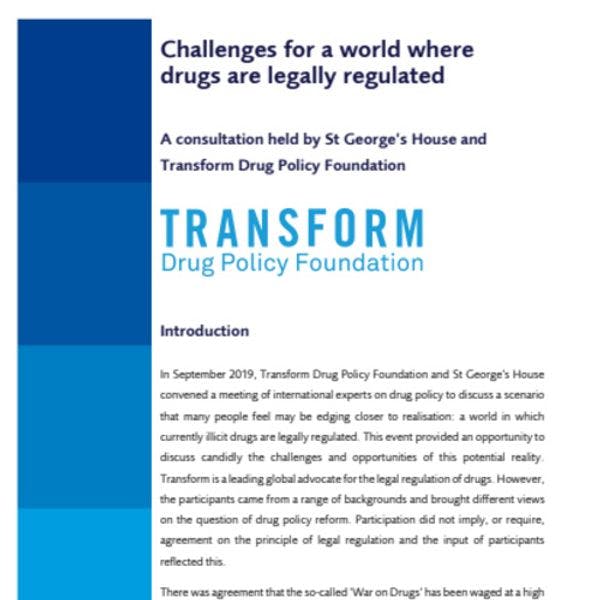Défis pour un monde où les drogues seraient légalement réglementées
Transform et St George's House discutent des principes qui devraient guider la mise en œuvre des marchés réglementés et leurs conséquences potentielles. Pour en savoir plus, en anglais, veuillez lire les informations ci-dessous.
In September 2019, Transform Drug Policy Foundation and St George’s House convened a meeting of international experts on drug policy to discuss a scenario that many people feel may be edging closer to realisation: a world in which currently illicit drugs are legally regulated. This event provided an opportunity to discuss candidly the challenges and opportunities of this potential reality.
Transform is a leading global advocate for the legal regulation of drugs. However, the participants came from a range of backgrounds and brought different views on the question of drug policy reform. Participation did not imply, or require, agreement on the principle of legal regulation and the input of participants reflected this.
There was agreement that the so-called ‘War on Drugs’ has been waged at a high price in terms of fuelling crime and violence, drug-related health harms and deaths, undermining of institutions through corruption, and the exploitation and abuse of some of the world’s most vulnerable communities. This reflects wider shifts in attitudes towards drug policy. Global consensus on the goal of achieving ‘drug free society’ through the criminalisation of production, supply and possession has decisively fractured, with a growing number of jurisdictions experimenting with both the decriminalisation of possession, and more recently, the legal regulation of cannabis supply (including Canada, Uruguay, Mexico, and 11 US states, including California). Bolivia has also regulated the production of coca.
This consultation sought to grasp that moment and imagine a scenario where the legal regulation of drugs became a more global reality, for different drugs in different regions. The intention was not to anticipate the circumstances through which regulated markets might come to pass, or to rehearse well-trodden arguments for or against prohibition, but rather to imagine what consequences such an eventuality might have for everybody involved in, or impacted by, the global drugs market. It was an opportunity to envision that possible world, and for participants to freely and candidly discuss their responses.
This report summarises the discussions held over the two days of consultation and draws out consensus conclusions which we hope will be useful to advocates, policymakers, researchers and other parties interested in navigating a way forward. It was drafted by the independent rapporteur, Peder Clark, with editorial input from Transform Drug Policy Foundation.
Taking the points of consensus together, we propose seven principles as emerging from the discussion. Rather than focusing on what drug policy should be, these set out some key values on which reform should be based.
